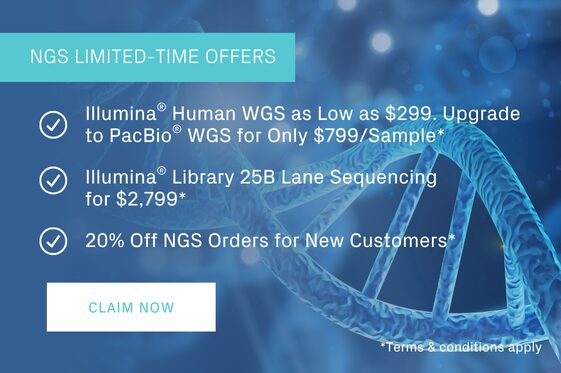Epigenomics (Epigenetic Sequencing)
Epigenetic sequencing, or epigenome sequencing, uses high-throughput sequencing technology to quantify and analyze DNA modifications that are involved in gene expression and regulation of cell differentiation and development. The epigenome encompasses chemical modifications to DNA and histone proteins, chromatin accessibility, and higher-order DNA organization. Its profound effect on gene regulation, and consequently development and pathogenesis, is still being explored. Although epigenetic modifications do not alter the nucleic acid sequence itself, sequencing techniques can detect them indirectly.
GENEWIZ offers epigenetic sequencing solutions such as methylation sequencing, ATAC-Seq, and ChIP-Seq for various sample types, including plant and animal samples.
Workshops
Step-by-Step RNA-Seq Bioinformatics Analysis
Thursday, March 19, 2026 | 11:00 AM EST
Register NowWhat are the methods of epigenetic sequencing?
To perform epigenetic sequencing, DNA methylation must be preserved and transformed into quantitative signals for genome-wide mapping. There are several methods of epigenetic sequencing; bisulfite sequencing (BS-Seq) and immunoprecipitation (methylated DNA immunoprecipitation or MeDIP) are commonly used in conjunction with NGS to identify epigenetically modified regions of the genome.
Epigenome Sequencing Services
-
Methylation Sequencing
Methylation sequencing provides robust, global detection of 5-methylcytosine (5mC), a common form of DNA methylation in eukaryotes.
-
PacBio® Methylation Sequencing
Whole genome sequencing on the PacBio® Sequel® can reveal a diverse array of DNA modifications, including 6-methyladenine (6mA) and 4-methylcytosine (4mC), as well as perform haplotype phasing of epigenetic markers.
-
ATAC-Seq
Assay for transposase-accessible chromatin sequencing (ATAC-Seq) employs Tn5 transposase to identify open chromatin with a higher signal-to-noise ratio and lower input requirements than other approaches.
-
ChIP-Seq
Chromatin immunoprecipitation sequencing (ChIP-Seq) identifies protein-DNA interactions and histone modifications across the genome, producing data with better resolution, less noise, and higher coverage than array-based technologies.
-
Single-Cell ATAC-Seq
Single-cell ATAC-Seq (scATAC-Seq) identifies genome-wide chromatin accessibility by profiling single cells in parallel, allowing researchers to examine how chromatin structure and DNA-binding proteins regulate gene expression in varying states and cellular processes.
NGS Platforms
For information on our NGS platforms as well as recommended configurations of your projects, please visit the NGS Platforms page. GENEWIZ does not guarantee data output or quality for sequencing-only projects.





